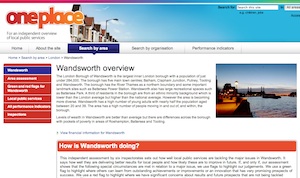I mentioned Wandsworth’s great results in the Audit Commission’s place survey in a post last week.
Over the weekend a short article by the council Leader, Edward Lister, appeared on the ConservativeHome website. (I’ve included the whole article at the end of this post.)
Obviously, I’m not going to disagree with his article – he’s basically my boss, and I’m not that stupid – but I would go further. Towards the end of the article Edward says:
…we should show above all that we are in tune with what people want in their lives – and relate this to a new understanding of what the public sector is for.
David Cameron will be elected with a mandate for radical change, and should use it. The UK has seen an unremitting tide of centralisation over the past 12 years and it’s time for it to be reversed.
Now many will point to the Thatcher government as centralising, but it tended to prescribe rather than control – councils were required to work in certain ways or prevented from undertaking certain actions – but in many ways it made little difference; it was remarkable, for example, how many Direct Service Organisations ‘won’ compulsory competitive tenders in old Labour authorities.
The Blair and Brown centralisation has been much more directive while wearing the clothes of localism. Labour’s new localism may have involved delegating powers, but it would come with an array of targets and quotas that meant local government was little more than an agency of central government and often given extra duties without sufficient extra resources.
The Conservative government needs to push power as close to the people as it can be. We currently have a state in which power is wielded in Whitehall, leaving people dependent on, and dismissive of, a remote and disinterested ‘state’.
If people are to have faith in politics again, then politics needs to mean something. The easiest and best way is to empower local councils so their decisions, reflecting the will of their communities, can show what real politics is about – effecting positive change.
And Wandsworth has been more of an exception than the rule in this. The Conservative council has a clear mission to provide quality services with low tax, and has been incredibly successful in delivering this. But in the majority of councils where everything is driven by central targets and Whitehall diktat and it’s easy to see why people take the view that it doesn’t matter who you vote for.
To be sure, it would be a brave decision for the Cameron government to give real power back to local councils. It doesn’t just mean, in some cases, giving power to Labour and Liberal Democrat councils, it also means giving councils freedom to do things differently and sometimes make mistakes. But that would also be part of creating political accountability at a local level. Having real power exercised locally will mean that people will start to see how important their vote really is, and that it can make a difference.
The full ConservativeHome article:
Cllr Edward Lister: Lessons from Wandsworth for David Cameron
There’s lessons for David Cameron in this week’s survey results on people’s attitudes to their local authority and the place where they live.
In Wandsworth’s case the Government’s Place Survey gave us approval ratings to die for – top in the country on value for money (73 per cent) and top again for satisfaction with the council (75 per cent).
In London average satisfaction scores fell – down to 49 per cent. So what is Wandsworth doing that is different?
Well we do have the clear advantage of the UK’s lowest council tax – but that’s only one component. When residents are judging us on value for money they are influenced by their overriding perception of what the authority is about.
How was I treated last time I dealt with the town hall? Does the council share my concerns on quality of life issues? And how does it look after the local area?
The Wandsworth formula has been finely tuned over the years. Through a rigorous process of scrutiny and challenge that stretches into every corner of municipal activity we make sure we get the last pound of value from every service.
And like any sound business we don’t just do this once – it is a constant process of review which keeps asking why things are done the way are – and whether they could be done differently.
Wandsworth has a young and fast-changing population. Most people are here because they want to be here. It’s our job to identify with the aspirations of our residents and protect the character and quality of the place where they have chosen to live.
A Cameron government will have its work cut out getting the public finances in order – it will have to move very quickly to demonstrate that it knows how to get real value from all that hard earned taxpayers’ money.
Cutting waste and insisting on value for money from public services will be a popular strategy to start with. But it needs to go deeper if it is to generate and sustain voters’ trust in the longer term.
As Conservatives we should show above all that we are in tune with what people want in their lives – and relate this to a new understanding of what the public sector is for.
It’s about saying to the public ‘we are there for you’ – and meaning it.
 Nothing like a happy hypocrite. Despite whole-heartedly concurring with the council’s decision to do minimal work for the assessment I’m still chuffed to see that Wandsworth is an excellent council according to the Audit Commission.
Nothing like a happy hypocrite. Despite whole-heartedly concurring with the council’s decision to do minimal work for the assessment I’m still chuffed to see that Wandsworth is an excellent council according to the Audit Commission.